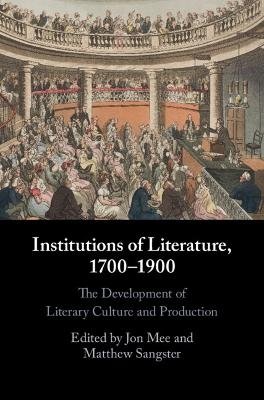
Institutions of Literature, 1700–1900
Cambridge University Press (Verlag)
978-1-108-83020-1 (ISBN)
This collection provides students and researchers with a new and lively understanding of the role of institutions in the production, reception, and meaning of literature in the period 1700–1900. The period saw a fundamental transition from a patronage system to a marketplace in which institutions played an important mediating role between writers and readers, a shift with consequences that continue to resonate today. Often producers themselves, institutions processed and claimed authority over a variety of cultural domains that never simply tessellated into any unified system. The collection's primary concerns are British and imperial environments, with a comparative German case study, but it offers encouragement for its approaches to be taken up in a variety of other cultural contexts. From the Post Office to museums, from bricks and mortar to less tangible institutions like authorship and genre, this collection opens up a new field for literary studies.
Jon Mee is Professor of Eighteenth-Century Studies at the University of York. His books include Conversable Worlds: Literature, Contention, and Community 1762-1830 (2011), and Print, Publicity, and Popular Radicalism in the 1790s (2016). He is currently completing a book on cultural networks in the industrial revolution for which he held a British Academy-Leverhulme Senior Research Fellowship, 2020–21. Matthew Sangster is Senior Lecturer in Romantic Studies, Fantasy and Cultural History at the University of Glasgow, and the author of Living as an Author in the Romantic Period (2021). He is co-investigator on two AHRC projects on historical library borrowings and has served on the Executive of the British Association for Romantic Studies for twelve years.
Introduction: literature and institutions Jon Mee and Matthew Sangster; 1. Knowledge exchange in the seventeenth century: from the third university to the royal society Willy Maley; 2. Supporting mutual benevolence: libraries, civic benefaction and the spalding gentlemen's society, 1709–1755 Dustin Frazier Wood; 3. Institutions without addresses David A. Brewer; 4. Eighteenth-century Musenhof courts as bridges and brokers for cultural networks and social reform Nicole Pohl; 5. Becoming institutional: the case of the Anacreontic society Ian Newman; 6. Circulating libraries as institutional creators of genres Anne H. Stevens; 7. Lecturing networks and cultural institutions, 1740–1830 Jon Klancher; 8. Catalogues as instituting genres of the nineteenth-century museum: the two hunterians Dahlia Porter; 9. Charles lamb and the British museum as an institution of literature Gillian Russell; 10. A disruptive and dangerous education and the wealth of the nation: the early mechanics' institutes John Gardner; 11. The ladies contribution: women and the mechanics institute on the goldfields of Victoria Sarah Comyn; 12. Letters must increase: reading and writing the post office as a literary institution Karin Koehler; 13. Networks, nodes and beacons: cultural institutions in nineteenth-century Southeast Asia Porscha Fermanis; 14. The book as medium Sarah Crofton.
| Erscheinungsdatum | 22.07.2022 |
|---|---|
| Zusatzinfo | Worked examples or Exercises |
| Verlagsort | Cambridge |
| Sprache | englisch |
| Maße | 157 x 235 mm |
| Gewicht | 610 g |
| Themenwelt | Geisteswissenschaften ► Sprach- / Literaturwissenschaft ► Anglistik / Amerikanistik |
| Geisteswissenschaften ► Sprach- / Literaturwissenschaft ► Literaturgeschichte | |
| Geisteswissenschaften ► Sprach- / Literaturwissenschaft ► Literaturwissenschaft | |
| ISBN-10 | 1-108-83020-X / 110883020X |
| ISBN-13 | 978-1-108-83020-1 / 9781108830201 |
| Zustand | Neuware |
| Haben Sie eine Frage zum Produkt? |
aus dem Bereich


